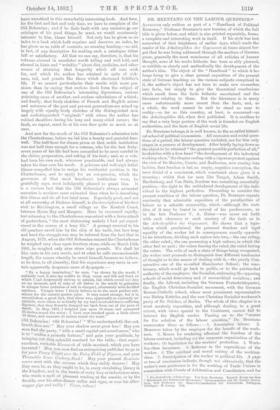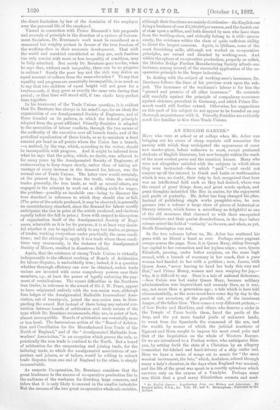DR. BRENTANO ON THE LABOUR QUESTION.*
ALTHOUGH only written as part of a Handbook of Political Economy," Professor Brentano's new treatise, of which the full title is given below, and which is also printed separately, forms a complete and interesting work in itself, If his style has lost
somewhat of that brightness of earlier days, which made the
reader of his Arbeitergilden der Gegenwart at times almost for- get that he was being addressed through the medium of German prose, generally the most wearisome of all vehicles of human thought, none of his works hitherto has been so ably planned, or exhibits so clearly and methodically the development of the author's idea. The object of the " Handbook " to which it be longs being to give a clear general exposition of the present state of German teaching on the various subjects comprised in it, the author's object has not been to make new researches, into facts, but simply to give the theoretical .conclusions which result from the facts hitherto ascertained and the literature relating to them. But the literature is in many cases unfortunately more recent than the facts, and, as a whole, the work cannot be said to stand as near to- reality-, so far as this country, at least, is concerned—as the Arbeitergilden did, when first published. It is needless to say that a very large portion of the work is founded on English authorities, and the facts of English social life.
Dr. Brentano belongs, it is well known, to the so-called histori- cal school of 'political economists. All economic and social ques- tions of a period, the labour question included, are for him only stages in a process of development. After briefly laying down as the object to be attained "the greatest possible perfection of all," he sketches with a firm hand "the development of the industrial working-class," the chapter ending with a vigorous protest against the view of De Pelaistre, Comte, and Rodbertus, now coming into fashion, that freedom is but an empty, negative conception, the mere denial of a constraint, which constraint alone gives it a meaning ; whilst that for men like Turgot, Adam Smith, Hardenberg, and Von Stein, freedom was something essentially positive,—the right to the unhindered development of the indi- vidual to the highest perfection. Proceeding to consider the present condition of the labour question, Dr. Brentano repeats succinctly that admirable exposition of the peculiarities of labour as a saleable commodity, which—although the root= idea of it may be found in several of his predecessors, as in the late Professor V. A. Huber—was never set forth. with such clearness or such mastery of the facts as in the Arbeitergi/dea der Gegenwart. He shows that a legis- lation which proclaimed the personal freedom and legal equality of the worker led to consequences exactly opposite to its intentions, dividing each nation into two,—the one rulings. the other ruled ;, the one possessing a high culture, in which the other had no part; the rulers fearing the ruled, the ruled hating the rulers. The evils of such a state of things being recognised, the writer next proceeds to distinguish four different tendencies of thought as to the means of dealing with it,—the purely Con- servative one of the so-called Manchester School ; the reac- tionary, which would go back to guilds, or to the patriarchal authority of the employer; the Socialist, embracing the opposing schools of social democracy and of monarchical socialism; and finally, the Liberal, including the 'German Fortschrittspaatei, the English Christian-Socialist. movement, with the German Roman-Catholic school, whose most prominent representative was Bishop Ketteler, and the new Christian Socialist workmen's party of Dr. Stocker, of Berlin. The whole of this chapter is a most masterly exposition, and although dealing, to a great extent, with views special to the Continent, cannot fail to inteiest the English reader. Passing on to the "moans for the solution of the labour question," Dr. Brentano enumerates these as follows : —1. Associative labour. 2. Measures taken by the employer for the benefit of the work- men. 3. Means for rendering effectual the freedom of the labour-contract, including (a) the corporate organisation of the workers ; (b) legislation for the workers' protection. 4. Work. ing-class insurance. 5. Reforms in the expenditure of the worker. 6. The spiritual and moral raising of the working class. ' 7. Participation of the worker in political life. A page or two of conclusion indicate, though not obtrusively, that the writer's own preference is for the working of Trade Unions in connection with Courts of Arbitration and Conciliation, and for his Gewevbricho Arbeiterfrage, Von Lnjo Brentano. &prat Abzug Rua don " Handbuch der Patitischou CEcomanic," borausgegeben von Dr. Gustav 8ohiin. berg, Ord Professor der Staatswistensobaften der iTuiversittit Tubingen. Tubingen : H. Laupp. 1982.
the direct limitation by law of the dominion of the employer over the personal life of the employed.
Viewed in connection with Prince Bismarck's late proposals and avowals of principle in the direction of a system of Govern- ment Socialism, Dr. Brentano's work must be considered as a measured but weighty protest in favour of the true freedom of the working-class in their economic development. That with the world and mankind constituted as they are, such freedom can only consist with more or less inequality of condition, may be fully admitted. But surely Dr. Brentano goes too far, when he says that, without such inequality, there can be no progress in culture ? Surely the poor boy and the rich may derive an equal amount of culture from the same education ? To say that equality and progress are essentially incompatible, is as much as to say that two children of equal height will not grow for a twelvemonth, if they grow at exactly the same rate during that period ; or that time will stand still, if two clocks keep perfect time together.
In his treatment of the Trade Unions question, it is evident that Dr. Brentano has always in his mind's eye, for an ideal, the organisation of our Amalgamated Society of Engineers, and of those founded on its pattern, in which the federal principle adopted from the great affiliated Friendly Societies is adapted to the necessities of labour conflicts, through the two means of the authority of the executive over all branch funds, and of the periodical equalisation of those funds, so as to maintain a fixed amount per head on all points where the Union has a branch, —a method, by the way, which, according to the writer, should be incompatible with progress. And it might be inferred from what he says that the policy, which, no doubt, was adhered to for many years by the Amalgamated Society of Engineers, of endeavouring to keep wages steady, rather than of taking ad- vantage of every increase in the demand for, labour, was the normal one of Trade Unions. The latter view would certainly, at the present day, be far from the truth, when the mining trades generally, the iron trade, as well as several others, are engaged in the attempt to work out a sliding scale for wages, the problem—possibly an insoluble one—being to discover the true standard in reference to which they should rise or fall. (The price of the article produced, it may be observed, is generally an unsatisfactory standard, since the demand for labour mostly anticipates the rise in price of the article produced, and slackens equally before the fall in price.) Even with respect to the system of organisation itself of the Amalgamated Society of Engi- neers, admirable as it is for its purpose, it is at least very doubt- ful whether it can be applied safely to any but trades, or groups of trades, working everywhere under practically the same condi- tions ; and the attempt to apply it to a trade where those condi- tions vary enormously, in the instance of the Amalgamated Society of Miners, resulted in disastrous failure.
Again, that the existence of strong Trade Unions is virtually indispensable to the efficient working of Boards of Arbitration for labour disputes, is undoubtedly true ; indeed, it is a question whether thorough efficiency can ever be obtained, unless trade unions are invested with some compulsory powers over their members, e.g., at least the power of legally enforcing the pay- ment of contributions. The recent difficulties in the Northern iron trades, in reference to the award of Sir J. W. Pease, appear to have originated entirely with the non-union men, although four lodges of the Amalgamated Malleable Ironworkers' Asso- ciation, out of twenty-six, joined the non-union men in disre- garding the award. But instead of there being any natural con- nection between boards of arbitration and trade unions of the type which Dr. Brentano recommends, they are, in point of fact, almost incompatible. Boards of arbitration aro essentially more or less local. The harmonious action of the "Board of Arbitra- tion and Conciliation for the Manufactured Iron Trade of the North of England," and of the "Amalgamated Malleable Iron- workers' Association," is an exception which proves the rule, as practically the iron trade is confined to the North. But a board of arbitration for the carpentering and joining trade, for the tailoring trade, to which the amalgamated associations of car- penters and joiners, or of tailors, would be willing to submit trade disputes from one end of England to the other, is simply inconceivable.
As respects Co-operation, Dr. Brentano considers that the great hindrance to the success of co-operative production lies in the unfitness of the workman for directing large concerns, and infers that it is only likely to succeed in the smaller industries But the success of the two great co-operative wholesale societies, although their functions are mainly distributive—the English one doing a business of over £3,500,000 per annum, and the Scotch one of close upon a million, and both directed by men who have risen from the working-class, acid virtually belong to it still—proves surely, the existence within the class of quite'sufficient ability to direct the largest concerns. Again, in Oldham, some of the most flourishing mills, although not worked on co-operative principles, are owned and directed by working-men. And within the sphere of co-operative production, properly so called, the Hebden Bridge Fustian Manufacturing Society affords one instance, among several, of the successful application of the co- operative principle to the larger industries.
In dealing with the subject of working-men's insurance, Dr. Brentano follows the lines of his previous work upon the sub- ject. The insurance of the workman's labour is for him the "ground and premiss of all other insurance." He contends still manfully against the principle of compulsory assurance against sickness, prevalent in Germany, and which Prince Bis- marck would still further extend. Otherwise, his suggestions on this part of his subject do not appear to be founded on any thorough acquaintance with it. Friendly Societies are evidently much less familiar to him than Trade Unions.



































 Previous page
Previous page